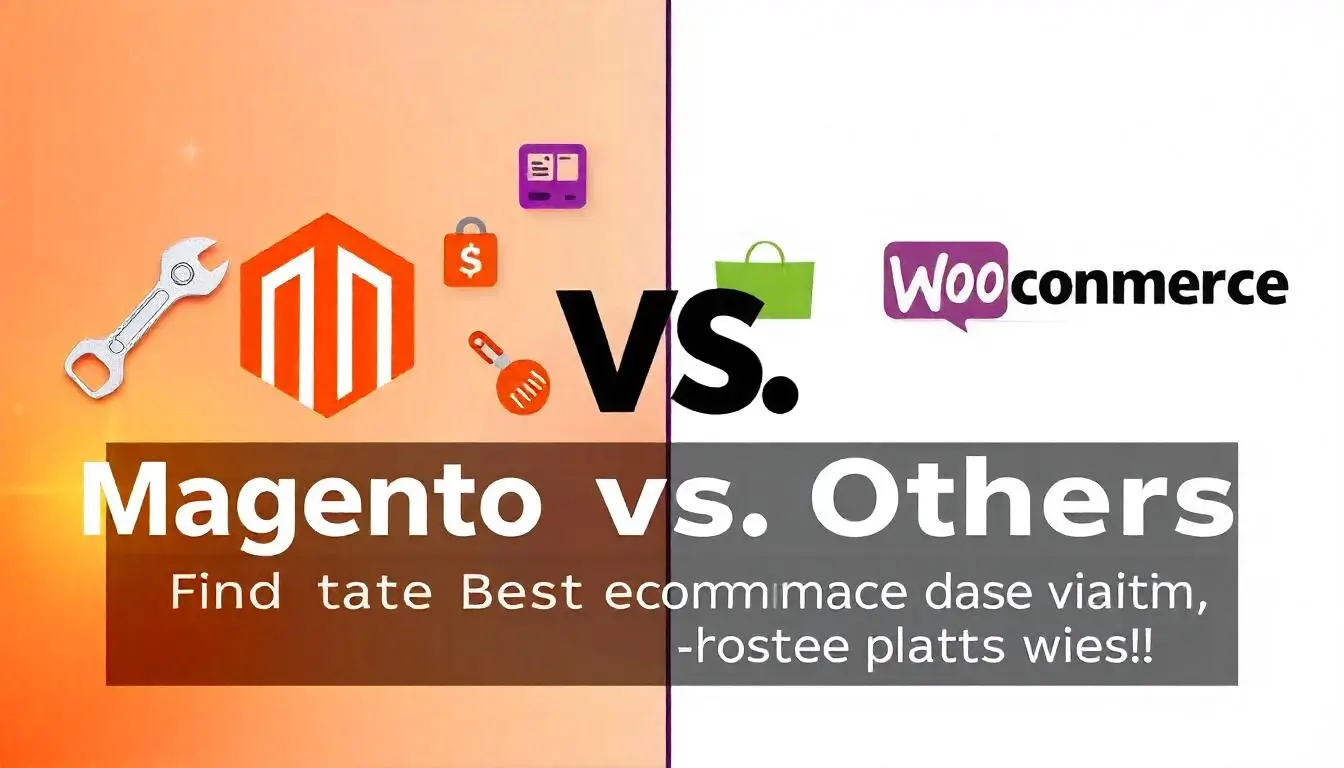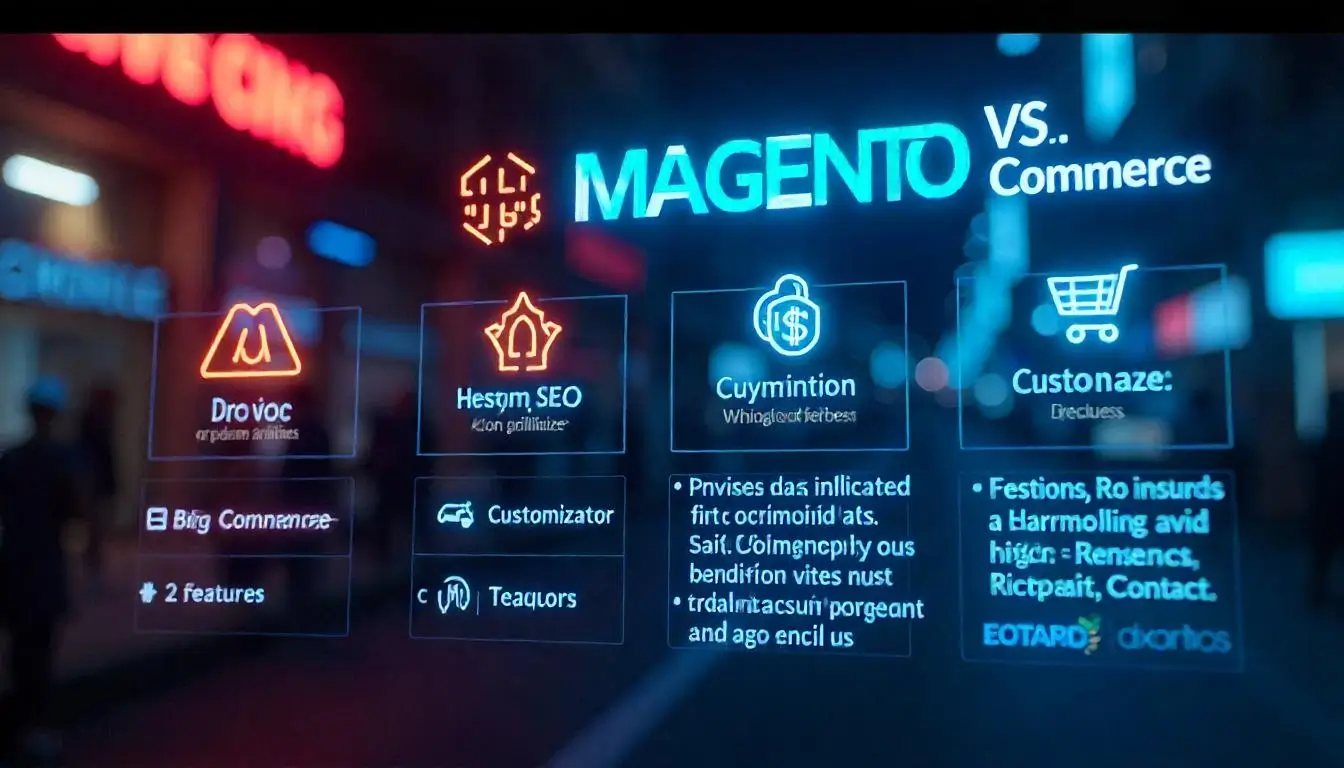Magento vs. Other Ecommerce Platforms: Which is Best for Your Store?

When building an online store, choosing the right platform is a critical decision that can shape your business’s future. Among the many ecommerce platforms available, the Magento ecommerce platform stands out as a favorite for businesses of all sizes. But how does Magento compare to other popular platforms like Shopify, WooCommerce, and BigCommerce?
In this blog, we’ll dive deep into the features, strengths, and limitations of Magento and compare it with other leading platforms to help you decide which one is best for your store.
What is the Magento Ecommerce Platform?
The Magento ecommerce platform, developed by Adobe, is a robust open-source solution for creating online stores. Known for its high level of customization, scalability, and flexibility, Magento is an ideal choice for businesses with complex requirements or plans for long-term growth.
Before diving into the comparison, let’s briefly explore the key strengths of Magento:
- Open-source flexibility for custom development.
- Advanced SEO capabilities.
- Ability to handle large-scale operations with ease.
- Built-in features for multi-store management and international sales.
Magento vs. Shopify: The Customization Battle
Shopify is one of the most user-friendly ecommerce platforms, making it a popular choice for small to medium-sized businesses. But how does it stack up against Magento?
1. Ease of Use
- Magento: Requires technical expertise and development knowledge. Perfect for businesses that need advanced customizations.
- Shopify: A beginner-friendly platform with drag-and-drop tools for creating a store without coding knowledge.
Verdict: Shopify wins for ease of use, but Magento is better for businesses with access to developers.
2. Customization Options
- Magento: Allows complete control over design, functionality, and integrations thanks to its open-source nature.
- Shopify: Offers limited customization options due to its closed-source system.
Verdict: Magento is the clear winner for businesses that require flexibility and advanced features.
3. Scalability
- Magento: Can handle large-scale operations, making it suitable for enterprises.
- Shopify: Works well for small to medium businesses but may require upgrades to Shopify Plus for enterprise needs.
Verdict: Magento excels in scalability, making it ideal for growing businesses.
Magento vs. WooCommerce: The Battle of Open-Source Platforms
WooCommerce is a popular plugin for WordPress, known for its simplicity and affordability. Let’s see how it compares to Magento.
1. Flexibility and Features
- Magento: Comes with built-in advanced features like multi-store management, robust reporting, and SEO tools.
- WooCommerce: Requires additional plugins for features like multi-language support or advanced reporting.
Verdict: Magento wins for its out-of-the-box advanced features.
2. Cost
- Magento: Free to use (Magento Open Source), but development and hosting costs can add up.
- WooCommerce: Free plugin, but hosting, themes, and plugins may increase the cost.
Verdict: WooCommerce is more affordable for small stores, but Magento offers better value for businesses that require robust features.
3. Performance
- Magento: Optimized for handling large product catalogs and traffic.
- WooCommerce: Performance can vary based on the hosting provider and installed plugins.
Verdict: Magento leads in performance for medium to large stores.
Magento vs. BigCommerce: A Scalability Showdown
BigCommerce is a hosted ecommerce platform known for its scalability and ease of use. Let’s compare its strengths against Magento.
1. Hosting and Maintenance
- Magento: Self-hosted, giving you control over your hosting environment but requiring technical expertise for maintenance.
- BigCommerce: Fully hosted, eliminating the need for server management.
Verdict: BigCommerce wins for businesses looking for a hassle-free hosted solution.
2. SEO and Marketing Tools
- Magento: Advanced SEO features, including URL customization, meta tags, and schema markup.
- BigCommerce: Decent SEO tools, but slightly less comprehensive than Magento.
Verdict: Magento offers more advanced SEO capabilities.
3. Cost
- Magento: Development and hosting costs can vary based on business needs.
- BigCommerce: Transparent pricing but includes additional fees for high-revenue businesses.
Verdict: Magento offers better flexibility in pricing for growing enterprises.
Key Features Comparison Table

Here’s a quick comparison of Magento and other popular ecommerce platforms:
| Feature | Magento | Shopify | WooCommerce | BigCommerce |
|---|---|---|---|---|
| Customization | Full control | Limited | Moderate | Limited |
| Ease of Use | Requires expertise | Beginner-friendly | Intermediate | Beginner-friendly |
| SEO Tools | Advanced | Decent | Basic (without plugins) | Moderate |
| Scalability | Enterprise-ready | Suitable for SMBs | Small to medium stores | Enterprise-ready |
| Hosting | Self-hosted | Fully hosted | Self-hosted | Fully hosted |
| Cost | Flexible | Transparent | Low upfront | Transparent |
Why Choose Magento Over Others?

While other platforms like Shopify, WooCommerce, and BigCommerce offer their own set of strengths, the Magento ecommerce platform remains the top choice for businesses seeking:
- Advanced customization for unique business needs.
- Enterprise-level scalability to handle large product catalogs and traffic.
- Robust multi-store management and support for international sales.
- Comprehensive SEO tools for better search engine rankings.
When to Choose Other Platforms?
- Shopify: If you’re a beginner and want a quick, hassle-free setup.
- WooCommerce: If you’re already using WordPress and want a cost-effective solution.
- BigCommerce: If you prefer a hosted solution with excellent scalability for mid-sized businesses.
Conclusion
Choosing the right ecommerce platform depends on your business goals, budget, and technical expertise. The Magento ecommerce platform is ideal for businesses that value flexibility, scalability, and advanced features. However, platforms like Shopify, WooCommerce, and BigCommerce cater to different needs and can be great options for specific scenarios.
Take the time to evaluate your requirements and select the platform that best aligns with your goals. Remember, the right choice today can set the foundation for your ecommerce success tomorrow!
Do you have experience using Magento or other platforms? Share your thoughts in the comments below!
Related Posts
How Electronic Commerce (E-Commerce) is Transforming Retail in 2025 Why Ecommerce Business Is the Best Startup Option Today Shopify Website Builder vs Competitors: Which One Wins? Top B2B Ecommerce Solutions for 2025: Powering Your Business Growth Top 10 eCommerce Web Design Agencies in 2025: Who’s Leading the Game?


Leave a comment